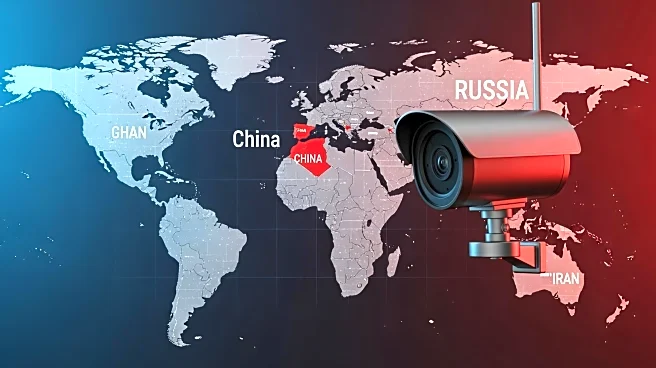What's Happening?
The head of the UK's domestic intelligence agency, MI5, has issued a stark warning about the increasing threats posed by China, Russia, and Iran. MI5 Director-General Ken McCallum highlighted that these
nations are employing aggressive tactics such as cyberespionage, surveillance sabotage, and physical violence. The agency has seen a 35% increase in espionage investigations over the past year, targeting critical infrastructure and public life. The warning comes amid a collapsed prosecution case against two individuals accused of spying for China, raising questions about the UK's ability to counteract such threats. McCallum emphasized the complexity of the UK's relationship with China, which involves both risks and opportunities.
Why It's Important?
The escalating threats from China, Russia, and Iran have significant implications for national security and international relations. These developments could impact the UK's economic stability, political landscape, and public safety. The increase in espionage activities highlights vulnerabilities in critical sectors, potentially affecting industries reliant on secure data and infrastructure. The situation underscores the need for robust security measures and international cooperation to address these threats. The UK's approach to managing its relationship with China, balancing engagement with security concerns, will be crucial in shaping future diplomatic and economic interactions.
What's Next?
The UK government is expected to make a decision on China's application to build a new embassy in London by December 10, amid concerns about espionage risks. The ongoing surveillance and espionage activities may prompt further security measures and legislative actions to protect national interests. The intelligence community will likely continue to monitor and disrupt hostile plots, while policymakers may seek to strengthen alliances with other nations facing similar threats. The situation may also influence public discourse on national security and foreign policy, potentially affecting upcoming political decisions.
Beyond the Headlines
The broader implications of these threats include ethical and legal challenges in balancing national security with civil liberties. The rise in espionage and cyber threats may lead to increased scrutiny of foreign investments and diplomatic engagements. The UK's response to these threats could set precedents for other nations facing similar challenges, influencing global security policies and international relations. Additionally, the potential risks associated with artificial intelligence, as highlighted by McCallum, may drive further research and regulation in the tech industry.









